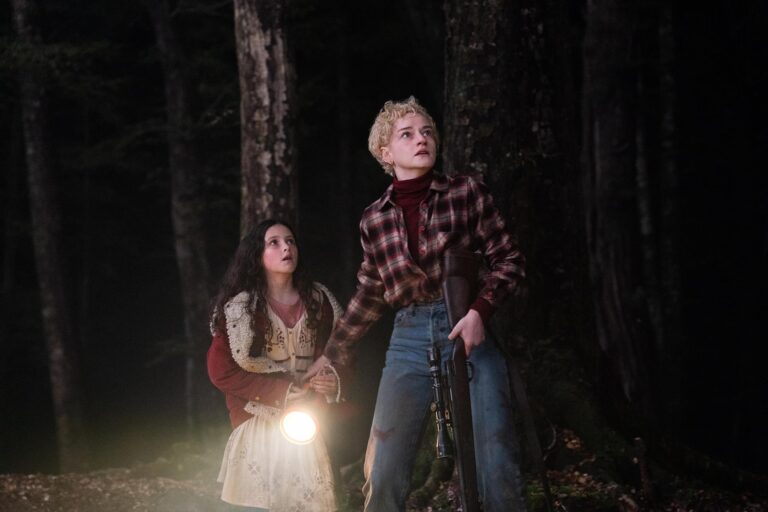Leigh Whannell seemed like the perfect filmmaker to breathe new life into Universal’s Wolf Man. Not only was he the creative voice behind Saw and Insidious — two juggernaut franchises of modern horror — but he revitalized The Invisible Man by resurrecting H.G. Wells’ dusty old spook and transforming him into an avatar for the very modern terror of toxic relationships, pairing timeless terror with sharp social commentary. Surely Whannell could breathe similar life into the moonlit melodrama of the werewolf genre, right?
Well, not so much.
Instead of the sleek, subversive genre piece we hoped for, Wolf Man feels like the cinematic equivalent of stepping on a rake in the dark: clumsy, unpleasant, and vaguely embarrassing for everyone involved. It’s not without ambition — Whannell clearly aims to explore heavy themes like intergenerational trauma and masculinity — but the execution leaves you wishing he’d just let the beast off the leash and had a little fun instead. Watching a guy in a rubber wolf suit howl at the moon would’ve been a vast improvement.
Granted, the deck may have been stacked against Whannell from the beginning, as there’s no shortage of baggage attached to the character. Universal has been trying to make werewolves a viable box office commodity for decades, and the results have ranged from inspired (John Landis’ An American Werewolf in London remains an all-timer) to embarrassing (Benicio Del Toro took a crack at this in 2010) to downright catastrophic (let’s not forget the much-hyped “Dark Universe” mega-franchise that imploded after the failure of The Mummy). Werewolf stories have always walked a fine line between tragedy and camp, and Whannell is clearly trying to push this reboot toward something heavier and more introspective, but the movie collapses under the weight of its own self-seriousness, and in its attempt to be meaningful, it forgets to be fun — or scary.
The story begins with a tense prologue set in rural Oregon, where a young boy named Blake is raised by his hyper-masculine, emotionally distant father. There’s a local legend about a creature stalking the woods, and Dad is determined to toughen up his son to face the world, or die trying. You’d think moving somewhere without a werewolf problem might be the more reasonable strategy, but hey, parenting is hard. Fast forward thirty years, and Blake (Christopher Abbott) is now a neurotic father himself, haunted by his upbringing and desperate not to repeat his father’s mistakes. When his long-missing dad is declared legally dead, Blake decides the best way to exorcise his demons is to bring wife Charlotte (Julia Garner) and young daughter Ginger (Matilda Firth) along to empty out the isolated farmhouse where he grew up.
Naturally, things go south almost immediately, as Blake is attacked and bitten by a werewolf. The film tries to frame his slow transformation into a hairy killing machine as a metaphor for the cycle of abuse — how we become the things we hate and fear the most — but the symbolism is so heavy-handed that it borders on parody. It feels especially frustrating, because the premise does have potential, and framing the werewolf curse as a generational cycle tied to masculinity and fatherhood is an interesting angle. But there’s no room for nuance in a movie that practically screams its themes at you with every claw mark and tortured growl.
Wolf Man’s biggest misstep is its inability to balance its weighty themes with the inherent ridiculousness of the werewolf genre. Whannell seems determined to play things straight, but the result is a movie that feels stifled and self-conscious, afraid to embrace the campiness that could have made it more enjoyable. There’s no joy in the carnage, just a dour, overwrought slog that takes itself far too seriously. Perhaps even more egregious, the movie just isn’t scary. Whannell proved with The Invisible Man that he knows how to ratchet up tension and deliver unforgettable set pieces, but despite a similar budget and an equally ambitious approach to its source material, none of that careful craftsmanship is felt here. Perhaps it’s time for Universal to give this franchise the Old Yeller treatment.

